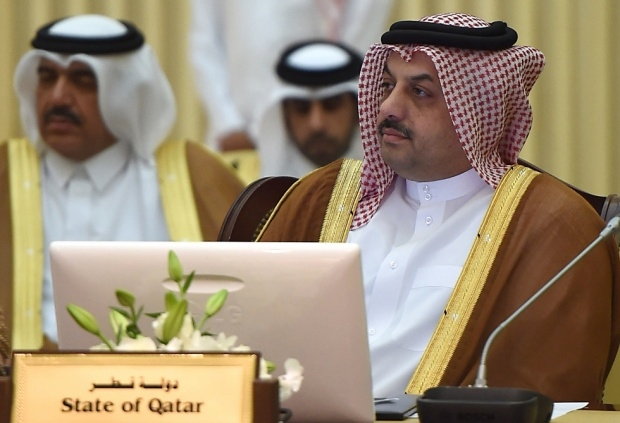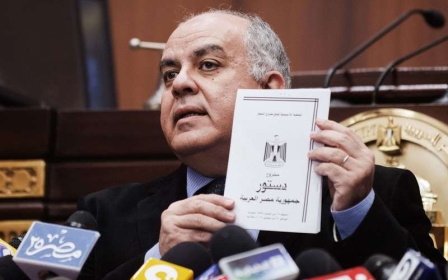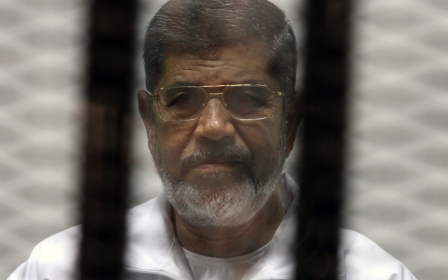Gulf 'black sheep' Qatar steps back into line on Brotherhood

By Rene Slama
DUBAI - Long seen as the "black sheep" of the Gulf monarchies for backing the Muslim Brotherhood, Qatar appears to have fallen into line with its neighbours and started to curb the group's activities, experts said.
Doha's support for the Brotherhood -- banned by most Gulf monarchies, who see the group's political Islam as a threat to their stability -- harmed ties with Saudi Arabia, the United Arab Emirates and Bahrain.
After the ouster of Egypt's Islamist president Mohamed Morsi in July 2013, Cairo labelled the Brotherhood a "terrorist organisation" and some of the group's leaders fled to Qatar.
Saudi Arabia and the Emirates withdrew their ambassadors, partly over Qatari support for the group, along with Bahrain, with all three decrying Qatari "interference" in their internal affairs.
Now, "Qatar has no option but to reduce -- not stop -- its relations with the Muslim Brotherhood," after banking on the group gaining the upper hand in countries hit by Arab Spring revolts in 2011, said Mustafa Alani from the Geneva-based Gulf Research Centre.
After condemning the jihadist Islamic State (IS) movement that has seized swathes of Iraq and Syria and helping secure the release of hostages held by other Islamist-held hostages in Syria, Qatar has worked to assuage disputes with its Gulf neighbours and the West.
The lead-up to a US-led campaign against IS has pushed Qatar to rebuild bridges in the region, Alani said.
Foreign policy
Doha requested the departure of Brotherhood leaders, Amr Darrag, a senior figure in the group said Saturday. Some of its "figureheads" agreed to relocate to "spare Qatar embarrassment," he added.
The measure affects seven officials of the group, including Mahmud Hussein -- thought to be the organisation's effective head-in-exile since Egypt detained much of its leadership.
The gas-rich emirate has attracted criticism for several aspects of its foreign policy, but backing the Brotherhood has been by far the most damaging, experts say.
The Brotherhood was founded in Egypt in 1928 and in the following decades branches opened in countries across the region.
It was banned in Egypt for decades before a 2011 uprising that overthrew veteran strongman Hosni Mubarak, and the Brotherhood won every election before Morsi's overthrow.
Doha's support for the group put it at loggerheads with Cairo and frayed ties with its Gulf neighbours, who threw their weight behind the military-installed government that followed Morsi.
Riyadh, Manama and Abu Dhabi pulled out their top envoys from Qatar in March, accusing Doha of interfering in their internal affairs.
The Brotherhood leaders' next stop could be Khartoum, said professor Abdulkhaleq Abdullah of the United Arab Emirates University. Turkey and Malaysia have also been cited as possibilities.
Under Saudi pressure
The "black sheep" of the Gulf "could not afford being isolated from its Gulf partners for too long," said Abdullah, adding it was unable to weather the "increasing pressure from major capitals, like Washington."
Abdullah said "high-profile Saudi diplomacy targeting Qatar" played a major role in forcing the change of course.
Alani agreed that Qatar "cannot resist" the pressure, so it "took a difficult decision" asking Brotherhood officials to leave. "They are giving a major concession here."
Foreign ministers from Saudi Arabia and Qatar met four times in the past three weeks, most recently on Thursday in the presence of US Secretary of State John Kerry.
Ten Arab countries including the six members of the Gulf Cooperation Council pledged at the meeting to do their "share in the comprehensive fight" against IS.
The editorial line of Qatar's Al-Jazeera channel remains a source of contention for Riyadh, Abu Dhabi and Manama, Alani said, as critics accuse it of a pro-Brotherhood bias.
Several Al-Jazeera journalists are currently in jail in Egypt for allegedly supporting the Brotherhood.
But with the departure of Brotherhood officials, the return of Gulf ambassadors to Doha has become a possibility.
Doha's move to fall into step with other Gulf monarchies suggests it is losing influence in the region, said Lina Khatib of the Carnegie Endowment for International Peace.
New MEE newsletter: Jerusalem Dispatch
Sign up to get the latest insights and analysis on Israel-Palestine, alongside Turkey Unpacked and other MEE newsletters
Middle East Eye delivers independent and unrivalled coverage and analysis of the Middle East, North Africa and beyond. To learn more about republishing this content and the associated fees, please fill out this form. More about MEE can be found here.




